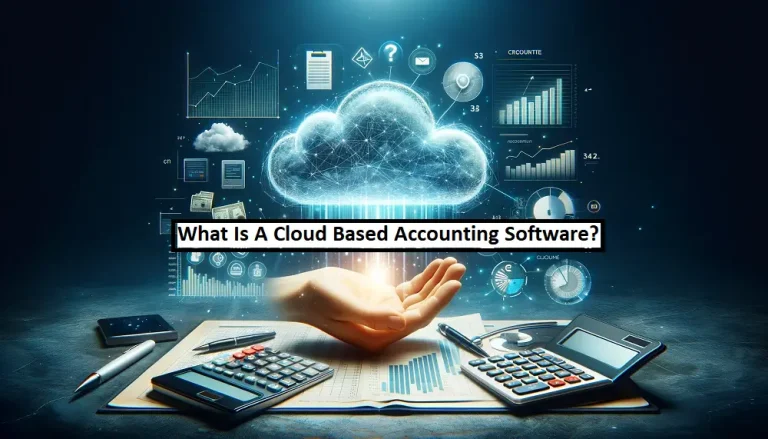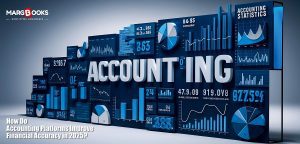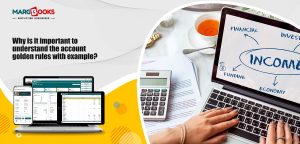Businesses are always on the lookout for smarter ways to handle their finances. One such game-changer is cloud based accounting software. This guide aims to break down the nitty-gritty of cloud accounting, showing you what it is, why it’s useful, and how it’s transforming the way businesses manage money.
What is Cloud Based Accounting Software?
Cloud accounting, also called online accounting software, is like doing your financial work on the internet. It’s not like the old-school way of installing software on your computer; instead, you use a website to manage all your money stuff.
Important Features of Cloud Based Accounting Software:
1. Easy to Get to and Work Together:
With cloud accounting, you can check your money stuff from anywhere, anytime. It’s like having your financial info in your pocket. Plus, it helps everyone on your team work together on money things in real-time.
2. Keeps Your Money Safe:
Storing money info online can be worrisome, but cloud accounting is serious about keeping things safe. It uses fancy tools like secret codes, extra checks when you log in, and regular backups to make sure your money info stays private and secure.
3. Grows with Your Business:
If your business is starting small but dreams of getting big, cloud accounting is a good pal. It can adjust and get bigger as your business does. It’s like having a tool that grows with you!
4. Updates by Themselves:
Cloud accounting software doesn’t wait for you to tell it to update; it does it by itself. This means you always get the newest and coolest features without having to do anything. It’s like magic, but without the hocus-pocus!
5. Works Well with Other Tools:
Imagine your money stuff working seamlessly with other tools you use. That’s what cloud accounting does – it buddies up with your customer list, online store, and payment tools to make everything run smoothly.
The Good Stuff – Why Cloud Accounting is Awesome:
1. Saves You Money:
No need for fancy computers or a big IT team. With cloud accounting, you pay for only what you use. This makes it great for small and medium-sized businesses that want to save some cash.
2. See Your Money in Real-Time:
Forget waiting for reports. Cloud accounting shows you how much money you have right now. It’s like having a financial crystal ball, but more accurate!
3. Keeps Your Money Safe (Again):
The people behind cloud accounting are serious about security. They use special locks and keys to keep your money info safe from bad guys. It’s like having a superhero guard for your finances!
4. Easy Recovery if Something Goes Wrong:
Imagine your computer crashes, and you lose all your money info. Scary, right? With cloud accounting, it’s not. They have backup plans to bring back your money info, just like a superhero saving the day!
Choosing the Right Cloud Accounting Software:
- Easy to Use: Pick software that doesn’t make your head spin. It should be easy for everyone on your team to understand and use.
- Grows with You: Your business will change, and your software should keep up. Choose something that can grow with you.
- Friends with Other Tools: Look for software that plays nice with others. It should connect well with your customer list, online store, and other tools you use.
- Safety First: Your money is important, so choose software that takes security seriously. Look for features like secret codes and backup plans.
- Helpful Support: When things get confusing, you want someone to help, right? Choose software that has friendly and helpful people ready to assist you.
Popular Cloud Based Accounting Software:
MargBooks, created by Marg ERP Ltd., stands out as the go-to cloud based accounting software for businesses. It’s like having your own virtual office accessible anytime, anywhere, on any device. With this software, business owners can effortlessly handle their accounting tasks, organize transactions, and maintain financial control, all in one secure place. It’s a user-friendly platform that simplifies bill and invoice management, making GST return filing a breeze. The software offers the convenience of connected banking, providing an inclusive solution for businesses of all sizes. MargBooks ensures that managing your business finances becomes a straightforward and stress-free experience.
Making the Switch to Cloud Accounting:
If you’re thinking about giving cloud accounting a try, here’s how you can make a smooth transition:
- Take a Tour: Most cloud accounting software offers a free trial. Take advantage of this and explore the software. Click around, try creating an invoice, or tracking an expense. Get a feel for how it works.
- Import Your Data: Moving your existing financial data to the cloud might sound complicated, but it’s usually straightforward. Many cloud accounting tools allow you to import data from spreadsheets or other accounting software. It’s like moving your stuff to a new house – a bit of work but worth it in the end.
- Get Your Team on Board: Cloud accounting is a team effort. Make sure everyone who deals with money in your business understands how to use the software. Most cloud accounting tools have easy-to-follow tutorials and support resources.
- Customize for Your Business: Every business is unique. Cloud accounting software often lets you customize things to match your business needs. Whether it’s creating custom invoices, adding specific expense categories, or setting up unique reports, make sure the software works the way you want it to.
- Test, Test, Test: Before fully committing, test the software with a few transactions. Create a mock invoice, record a dummy expense, and see how the software handles it. This is like taking your new car for a test drive to make sure everything runs smoothly.
Also read – How to Integrate Cloud-Based Accounting Software into Your Business
Ongoing Benefits of Cloud Accounting:
- Save Time: Cloud accounting is like having a personal assistant that works 24/7. It automates repetitive tasks, saving you time to focus on growing your business or enjoying a well-deserved break.
- Stay Organized: No more digging through piles of paperwork or endless spreadsheets. Cloud accounting keeps everything organized in one place. It’s like having a neat and tidy office without the effort.
- Access Anytime, Anywhere: Need to check your finances while sipping coffee at a café or during a family vacation? With cloud accounting, you can. It’s like having your office in your pocket, always ready when you need it.
- Collaborate Effortlessly: Working together on finances has never been easier. Cloud accounting allows multiple team members to collaborate in real-time. It’s like having a virtual team meeting without everyone being in the same room.
- Get Paid Faster: Cloud accounting often integrates with online payment options. This means you can send invoices that allow your customers to pay with just a few clicks. It’s like having a cash register that works even when you’re sleeping.
Further Insights into Cloud Accounting:
Now that you’re well-acquainted with the basics and benefits of cloud based accounting software, let’s delve deeper into some additional aspects that can enhance your understanding of this powerful financial management tool.
1. Advanced Reporting and Analytics:
One of the standout features of cloud accounting is its ability to generate advanced reports and analytics. Think of it as a super-smart assistant that not only keeps your financial records but also helps you understand them better. Cloud accounting software can create detailed reports on income, expenses, profitability, and more. It’s like having a financial advisor right at your fingertips, providing insights that empower better decision-making for your business.
2. Automation for Efficiency:
Cloud accounting takes mundane and repetitive tasks off your plate through automation. Tasks like invoicing, expense categorization, and even payment reminders can be set to run automatically. It’s like having a reliable assistant who never forgets to send out invoices or follow up on overdue payments. This automation not only saves time but also reduces the risk of human error, ensuring accuracy in your financial records.
3. Bank Feeds for Real-Time Updates:
Connecting your bank accounts to cloud accounting software brings a whole new level of convenience. Bank feeds allow your financial transactions to be automatically imported into the system in real-time. It’s like having a live feed of your financial activity, always up to date. This feature not only reduces manual data entry but also provides a real-time snapshot of your cash flow, helping you stay on top of your financial game.
4. Mobile Accessibility for On-the-Go Management:
Cloud accounting goes beyond the confines of a desktop. Most cloud accounting software comes with mobile apps, allowing you to manage your finances from anywhere with an internet connection. It’s like carrying your entire office in your pocket. Whether you’re on a business trip, at a client meeting, or simply enjoying a day off, you can access your financial data, send invoices, or approve expenses with just a few taps on your mobile device.
5. Compliance and Security Measures:
Addressing concerns about data security and compliance is a crucial aspect of cloud accounting. Cloud based accounting software providers prioritize stringent security measures. They implement encryption, secure login protocols, and comply with industry standards to ensure the safety of your financial data. It’s like having a fortress around your financial information, guarded against unauthorized access and potential threats.
Evolving Trends in Cloud Accounting:
As technology continues to advance, so does cloud accounting. Keeping an eye on emerging trends can give you a glimpse into the future of financial management:
1. Artificial Intelligence (AI) Integration:
Some cloud accounting platforms are exploring AI integration to automate more complex financial tasks. It’s like having a virtual financial advisor that learns and adapts to your business needs.
2. Blockchain for Enhanced Security:
Blockchain technology is making its way into cloud accounting to further enhance security and transparency. It’s like having an unbreakable chain protecting your financial data, ensuring its integrity.
3. Expanding Ecosystems:
Cloud accounting software is becoming part of larger business ecosystems. Integration with other business tools, like project management or customer relationship platforms, creates a seamless workflow. It’s like having a well-orchestrated symphony of tools working together for your business’s success.
Navigating Cloud Accounting: Tips and Tricks
Now that you’ve gained a solid understanding of the fundamentals and advanced features of cloud based accounting software, let’s explore some practical tips and tricks to make the most out of your cloud accounting experience.
– Regularly Reconcile Your Accounts:
Just like balancing your checkbook, regularly reconciling your accounts in cloud accounting ensures that your financial records match those of your bank. It’s like double-checking to make sure everything adds up correctly. This practice helps identify and resolve discrepancies promptly, maintaining the accuracy of your financial data.
– Set Up Alerts and Notifications:
Many cloud accounting platforms allow you to set up alerts for specific events, such as low account balances or overdue invoices. It’s like having a personal assistant who notifies you when something needs your attention. Utilize these features to stay on top of your finances and address potential issues before they become bigger problems.
– Take Advantage of Training Resources:
Cloud accounting software often provides training resources, tutorials, and webinars to help users navigate the system effectively. It’s like having a virtual guide to show you the ropes. Invest some time in exploring these resources to discover hidden features and learn how to optimize your workflow.
– Customize Reports for Better Insights:
Tailor your financial reports to match your business’s specific needs. Cloud accounting platforms offer customizable reporting features, allowing you to focus on the metrics that matter most to your business. It’s like creating a personalized dashboard that gives you a clear view of your financial performance.
– Collaborate Effectively with Your Team:
If you have a team handling various financial tasks, leverage the collaboration features of cloud accounting. Assign roles and permissions to team members, ensuring that each person has access to the information they need. It’s like having a shared workspace where everyone can contribute to the financial success of the business.
– Explore Integrations for Seamless Workflows:
Check if your cloud accounting software integrates with other tools your business uses, such as payment gateways, e-commerce platforms, or project management tools. Integrations create a seamless workflow, reducing the need for manual data entry and minimizing errors. It’s like connecting the dots between different aspects of your business for a smoother operation.
– Stay Informed About Updates and New Features:
Cloud accounting software is continuously evolving with updates and new features. Keep an eye on notifications from your software provider and explore any new features they introduce. It’s like staying up-to-date with the latest gadgets – you might discover a tool that revolutionizes the way you manage your finances.
– Backup Your Data Regularly:
While cloud accounting providers have robust backup systems, it’s still a good practice to periodically export and save your financial data. It’s like creating a safety net for your information. Having local backups ensures that you have access to your financial records even in the rare event of a system issue.
– Engage with the Community:
Many cloud accounting platforms have user communities or forums where users share tips, troubleshoot issues, and exchange advice. It’s like having a support group for your financial journey. Engaging with the community can provide valuable insights, and you might discover new ways to optimize your use of the software.
– Evaluate Your Software Regularly:
As your business grows, so do your needs. Periodically reassess whether your chosen cloud accounting software still aligns with your business requirements. It’s like upgrading your smartphone to the latest model for improved features and performance. Your software should evolve with your business to continue providing optimal support.
Conclusion:
In the dynamic world of cloud accounting, implementing these tips and tricks can elevate your financial management game. It’s like having a toolbox full of strategies to enhance efficiency, collaboration, and overall effectiveness.
Remember, the goal of cloud accounting is to simplify and improve your financial processes. By incorporating these practices into your routine, you’ll not only harness the full potential of your chosen software but also contribute to the ongoing success of your business.
Frequently Asked Questions
What’s cloud-based accounting software?
Cloud accounting software is like online banking for your business finances. Instead of storing your financial data on your computer, it’s safely kept on the internet. You can access it from anywhere with an internet connection.
Which is the best cloud accounting software?
MargBooks stands out as the premier choice for cloud-based accounting software, offering unparalleled features and reliability for managing your financial tasks with ease and confidence.
How does it differ from traditional software?
Unlike old-school software you install on one computer, cloud-based accounting lives online. This means you can work on your finances from any device, and updates happen automatically without you having to do anything.
Is it secure to use cloud-based accounting?
Yes, it’s secure. Cloud accounting companies use strong locks and keys to keep your financial info safe. They follow rules to make sure they’re protecting your data like they should.
Can I access my data from anywhere?
Absolutely! As long as you have internet, you can check your finances from your phone, computer, or tablet. It’s like having your accountant in your pocket.
How does it help with collaboration?
Cloud accounting lets you and your team work on finances together, even if you’re in different places. You can all see the same info at the same time and work together like superheroes
Does it offer real-time updates?
Yes, it’s like having a magic mirror that shows you the latest financial info right when it happens. No waiting around for updates – it’s all right there when you need it.
Can I customize reports and invoices?
Yep! You can make your reports and invoices look just the way you want. Change colors, add logos – it’s like decorating your own financial party.
How easy is it to integrate with other tools?
Super easy! Cloud accounting plays nice with other software, like your bank or payment apps. They talk to each other so you don’t have to do all the typing.
Is it scalable for growing businesses?
Totally! Whether you’re a tiny startup or a big-time business, cloud accounting can grow with you. Think of it like stretching a rubber band – it goes as big as you need.
What about data migration and support?
Moving your data to the cloud is like moving into a new house – the cloud folks help you move all your stuff so you feel right at home. And if you need help later, they’re like your financial superheroes, ready to save the day.




